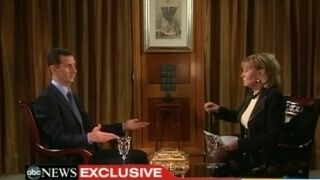 Everything you need to know about today’s media coverage of Israel and the Mideast.
Everything you need to know about today’s media coverage of Israel and the Mideast.
Sarah Schulman follows up on idiotic pinkwashing accusations. And Hamas hatches an election plan to get a foothold in Jerusalem and embarrass Israel.
Visit Backspin every day and never miss a Media Cheat Sheet.
Peace Process
• Hamas wants to collapse unity efforts and blame Israel in the process. Haaretz explains:
Hamas will only agree to hold presidential and parliamentary elections next May if voting takes place in East Jerusalem and Hamas is allowed to participate, Haaretz has learned – a condition to which Israel will almost certainly object.
This puts Hamas and Fatah’s agreement to hold elections in the West Bank and Gaza in a different light. A senior Palestinian source told Haaretz that Hamas had set the condition in an effort to torpedo the elections and thus avoid the risk of being forced out of power in the Gaza Strip. Hamas, however, is expected to blame Israel for blocking the democratic process, so that international pressure to allow them to run will be brought to bear, as it was before the parliamentary elections in January 2006. The Palestinian Authority is also expected to press for Hamas participation to embarrass the Israeli government.
• AP finds that the Palestinians want to use the holiday season to boost their statehood bid.
Here’s one facet of the game plan that’s already working. AP describes the effects of the security barrier on the Palestinians as real, while Israel’s reasons for putting it was put up are just a portrayal.
As part of the campaign, the Palestinians also offer pre-Christmas media tours to highlight Bethlehem area settlement expansion and the disruption caused by Israel’s separation barrier which surrounds the city on three sides. Israel announced or approved plans for thousands more apartments for Jews in the Bethlehem area in recent months, settlement watchdogs say.
“This Christmas will be an opportunity to show the real threat to the city of Bethlehem — the settlement enterprise and the wall that separates the city from its twin, Jerusalem,” said Ziad Bandak, an Abbas adviser on Christian affairs . . .
Israel portrays the wall as a defense against militants who during the years of violence would regularly infiltrate Israel, killing hundreds in suicide bombings and other attacks. The Palestinians denounce it a land grab, because in many places it encroaches into the West Bank, effectively pushing the de facto border forward.
• A Washington Times staff-ed accuses Obama of undermining Israeli security. This snippet refers to the Camp David Accords:
Mr. Obama, a fellow Nobel laureate, is undoing that historic achievement. He backed the removal of Egyptian President Hosni Mubarak, who had kept faith with the peace agreement for 30 years after the assassination of Sadat in 1981. Mr. Obama supports the political aspirations of the Egyptian Muslim Brotherhood, which will seek to discard the peace treaty with Israel at the first opportunity. Far from doing the most to secure Israel of any president, he may be doing the most to resurrect the specter of conflict with Egypt.
• Worth reading: Arabs Scared of the Truth
Iranian Issues
• Would Israel attack Iran without notifying the US? Reuters looks into the possibility and its implications.
• Tehran blocked the Virtual US Embassy in Iran a day after it was launched. Haaretz writes:
Iranian parliamentary speaker Ali Larijani said shortly afterwards that the online embassy plan would fail, and accused the Jewish lobby in the U.S. of being behind the project.

• Wow. The WSJ reports that the US considered a covert operation to destroy the advanced Sentinel stealth drone that crashed in Iran.
“No one warmed up to the option of recovering it or destroying it because of the potential it could become a larger incident,” the U.S. official said.
If an assault team entered the country to recover or destroy the drone, the official said, the U.S. “could be accused of an act of war” by the Iranian government.
• Over at The Guardian, Seumas Milne wrings his hands over the prospect of war with Iran.
Iran is of course an authoritarian state, though not as repressive as western allies such as Saudi Arabia. But it has invaded no one in 200 years. It was itself invaded by Iraq with western support in the 1980s, while the US and Israel have attacked 10 countries or territories between them in the past decade. Britain exploited, occupied and overthrew governments in Iran for over a century. So who threatens who exactly?
Uh, let’s see. When it comes to Iranian citizens, the mullahs are perfectly content to kill their own people. Neda Soltan (remember her?) is still the poster child of the regime’s brutality. And when it comes to foreign enemies, Iran’s perfectly content to outsource the dirty work to Hamas, Hezbollah, and friends, or let the Revolutionary Guards quietly do their thing. How many times have Iranian officials threatened to destroy Israel anyway?
Arab Spring
• Barbara Walters’ ABC News crew encountered media restrictions despite promises they could do what they wanted. More at The Lede.

• Hillary Clinton met Syrian opposition leaders in exile and came away impressed.
• A thoughtful Chrisitan Science Monitor op-ed makes the case for stronger US intervention in Syria.
- Syria has a significan chemical weapons that could hit the black market
- Al-Qaida has deeper ties in Syria
- ” Iran will not let its greatest Arab ally fall without a fight”
- The US has a moral imperative
Meanwhile, The Atlantic says the US is monitoring the chemical stockpiles.
The United States is believed to have prepared contingency plans for dealing with Syria’s toxic arsenal should it appear that the regime is about to use the weapons or pass them to affiliated extremist organizations such as Hezbollah.
• Egyptian secularists ask: Now what?
Rest O’ the Roundup

• Sarah Schulman follows up on her pinkwashing op-ed with a way long piece in the Huffington Post. She presents a detailed history of Israel-branding efforts, then reiterates her main thesis:
The goal of pinkwashing is to justify Israel’s policies of occupation and separation by promoting the image of a lone oasis of progress surrounded by violent, homophobic Arabs, thereby denying the existence of queer Palestinian movements, or of secular, feminist, intellectual and queer Palestinians. By ignoring the multi-dimensionality of Palestinian society, the Israeli government is trying to claim supremacy that in their minds justifies the occupation. Yet nothing justifies the occupation.
I responded to Schulman’s Pinkwashing Washout earlier today.
• David Frum tells the Jewish Chronicle he’s appalled by the UK media’s Mideast coverage. Here’s where he thinks the problems come from:
Casting an informed outsider’s eye over attitudes to Israel in Britain, Frum seems appalled by the UK media, which he thinks belie the healthy working relationship between the two countries. There is an environment, he notes, which hosts “fabrications” against Israel.
“The Jenin story was made in Britain, the so-called Gaza massacres were made in Britain. Because of the extraordinary reach of Britain’s media – the BBC, the Guardian – when an invention takes form, it’s very damaging. For certain segments of British life, they feel they can’t be patriotic and nationalistic any more about their own country. So they are looking for other places to be patriotic and nationalistic about. From Lord Byron on, there’s been a tendency to find British people in the middle of somebody else’s nationalism. There are people who adopt the Palestinian cause as a substitute for the nationalism that their grandparents felt and that they can’t express. It fills a missing place. People in the thrall of this kind of thing are blind. They think they are not antisemites because they didn’t start as antisemites. The fact that you found a modern way into antisemitism doesn’t make you any less antisemitic – just a more up-to-date version.”
• The Guardian picked up on the Advertising Standards Authority’s ruling against the PLO diplomatic mission in the UK.
• Mehdi Hasan’s in Doha visiting Al-Jazeera. I’m trying to figure out how large a word count can be before it takes an article beyond the range of “puff piece.” This New Statesman profile weighs in at a hefty 4,940-words.
• CNN picks up on another West Bank “price tag” mosque torching. This one was in the village of Burqin.
(Image of Schulman via Wikimedia Commons)

